-
 Art of Wellness Acupuncture & Traditional Chinese Medicine (TCM)11704 Wilshire Blvd, Suite 295, Los Angeles, CA, 90025
Art of Wellness Acupuncture & Traditional Chinese Medicine (TCM)11704 Wilshire Blvd, Suite 295, Los Angeles, CA, 90025
myartofwellness@gmail.com310-451-5522 Office Hours
MonClosedTue7:30 am --4 pmWed7:30 am --4 pmThu7:30 am -- 4 pmFri7:30 am -- 4 pmSat7:30 am -- 4 pmSunClosedOur office opens from Tuesdays to Saturdays 7:30 am to 4 pm, will be closed on Memorial day, Independent day, Labor day, Thanksgiving day, Christmas and New year.
-
Recent Posts
- How to Treat De Quervain’s Tenosynovitis With Acupuncture and TCM
- Chinese New Year 2026: Year of the Horse
- Acupuncture and TCM Treatment for Perimenopause Symptoms
- How to Treat Insulin Resistance With Acupuncture and TCM
- How to Treat Metabolic Syndrome With Acupuncture and TCM
- How to Treat Syncope With Acupuncture and TCM
- How to Treat Thoracic Outlet Syndrome With Acupuncture and TCM
- How to Treat Dupuytren’s Contracture With Acupuncture and TCM
- How to Treat Nutcracker Syndrome With Acupuncture and TCM
- How to Treat Rosacea With Acupuncture and TCM
- How to Treat Perioral Dermatitis With Acupuncture and TCM
- Lymphatic Drainage With Acupuncture and TCM
- How to Treat Turf Toe With Acupuncture
- How to Treat Nerve Pain With Acupuncture and TCM
- How to Treat Watery Eyes With Acupuncture and TCM
- How to Treat Ovarian Cysts With Acupuncture and TCM
- Sign up to receive news and updates and get my free report:“The Top 10 Reasons to Try Acupuncture”

December 2025 M T W T F S S 1 2 3 4 5 6 7 8 9 10 11 12 13 14 15 16 17 18 19 20 21 22 23 24 25 26 27 28 29 30 31
Inflammation
How to Treat Diverticulitis With Acupuncture and TCM
By Qineng Tan, L.Ac., Ph.D. and Xiaomei Cai, L.Ac., Ph.D.
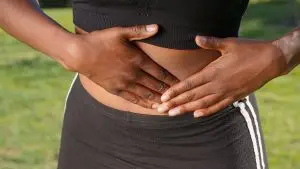
Pain in lower left abdomen? Stomach pain or pain in lower abdomen? Nausea, vomiting? Constipation or diarrhea? These may be diverticulitis symptoms. Acupuncture and TCM offer a way to help relieve diverticulitis pain and restore normal bowel function.
Diverticulosis refers to the presence of small sacs or pouches of tissue inside the large intestine, most often the colon (colonic diverticulitis), which are called “diverticula.”
Diverticulitis refers to the condition that occurs when the sacs become inflamed and infected. Diverticulitis causes pain and other symptoms like bloating and pain in left abdomen that might feel better after you pass gas or have a bowel movement.
Diverticular disease is becoming more and more common and is particularly widespread amongst older people, with at least half of all people over the age of 60 showing signs of diverticulosis.
While medical science has not definitively determined why people develop diverticulosis, it is believed to be due to eating a diet that is low in fiber and high in fatty foods like red meat.
Sedentary lifestyle (lack of exercise), being overweight or obese, smoking cigarettes, and regular use of anti-inflammatory medications or OTC pain medications (NSAIDs) may also be factors in the development of diverticulosis.
Many people have diverticulosis but are unaware of it because they don’t have any symptoms. It is only when the diverticula become infected and inflamed that diverticulitis treatment becomes necessary.
Acupuncture and TCM offer an alternative diverticulitis treatment that can help relieve pain and reduce inflammation in the colon.
Top 5 Diverticulitis Symptoms
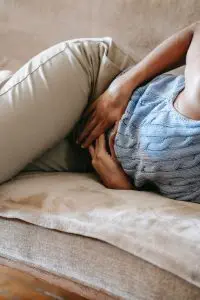
Diverticulitis symptoms are believed to occur because something like a bit of undigested food or stool becomes trapped inside one of the diverticula, and then bacteria start to grow, causing an infection.
While a person can have diverticulosis for a long time without any signs, symptoms of diverticulitis may come on suddenly and be quite severe.
The common signs of diverticulitis include:
- Abdominal pain or cramping, particularly pain in lower left abdomen—although in Asian countries, pain in lower right abdomen seems to be more prevalent. The pain may be constant, or it can come and go.
- Nausea and/or vomiting
- Fever and/or chills
- Constipation or diarrhea
- Rectal bleeding, bloody stool
Sometimes diverticulitis may cause a total lack of appetite and sudden weight loss, as a person just stops feeling like eating anything.
Diverticulitis can sometimes lead to more serious complications, like an abscess—which is when the infected area swells and fills with pus—or perforation of the bowel wall. These kinds of issues may require surgery.
Diverticulitis Treatment
Some other gastrointestinal disorders can present with symptoms that are similar to those of diverticulitis, such as: colitis or inflammatory bowel disease, IBS (irritable bowel syndrome), or bowel obstruction. Gynecological problems like endometriosis, an ovarian cyst, or an ectopic pregnancy could also cause severe pain in the lower left abdomen. A UTI could also cause acute abdominal pain.
Diagnosis of diverticulitis will usually begin with a doctor feeling the abdomen for signs of tenderness, then they will order tests (blood tests, urine tests, and/or stool tests) to check for infection. Once other problems have been ruled out, a CT scan may show the diverticula (infected sacs/pouches in the large intestine).
There is some debate about when to perform a colonoscopy in cases of diverticulitis, as the procedure can cause perforations of the intestinal lining to become worse. Usually, a colonoscopy is recommended several weeks after a person has recovered from an acute attack of diverticulitis.
Because diverticulitis is usually caused by an infection, the most common medical treatment is a course of antibiotics, along with rest and pain relievers, until the acute symptoms have abated. A liquid diet may be indicated until the situation improves, with the gradual reintroduction of solid foods.
Recommendations will usually include that a person quits smoking (if they smoke) and makes changes in their diet: especially eating less meat and fatty foods and increasing fiber intake. It used to be common for doctors to tell their patients not to eat foods like popcorn, seeds, or nuts, under the assumption that small, hard kernels might become trapped in the diverticula and cause irritation. However, more research has shown that eating these types of foods does not seem to cause flare-ups of diverticulitis.
If these treatments do not help to relieve diverticulitis pain, or if a complication like an abscess or perforation in the colon wall develops, surgery may be necessary. The most common surgery for diverticulitis is a colon resection, which involves removing the part(s) of the large intestine that have been damaged. Sometimes it is not possible to repair the colon completely, and in these cases, a person may have to have a colostomy.
Acupuncture and TCM offer an alternative or adjunct treatment for diverticulitis that can help reduce inflammation in the bowel and relieve abdominal pain.
Can Acupuncture Help Diverticulitis?
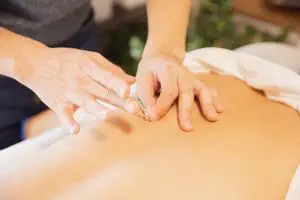
An acupuncturist will make a TCM diagnosis based on where and what kind of abdominal pain and other diverticulitis symptoms a patient is experiencing. According to TCM theory, pain and problems with the digestive organs can be related both to stagnant Qi (life energy) or blood in that area, and the presence of a pathogenic force like dampness, heat, or cold.
The quality of diverticulitis pain and how it changes when you eat or move your bowels will provide clues as to what the root cause is.
In TCM, the spleen is considered to be responsible for turning nutrients into energy; when it is not functioning well, a person may have diarrhea. Strengthening the spleen is usually an important part of TCM treatment for diverticulitis and other digestive disorders.
Your acupuncture practitioner can help relieve symptoms like nausea, constipation, diarrhea, bloating, and stomach pain, while also helping to heal and strengthen the lining of the intestines and reducing inflammation. Boosting immune function will help prevent further infections.
It is generally necessary for a person with diverticulosis to make changes in their dietary habits. While increasing intake of fiber and fluids is important, there are probably even more specific foods that are triggering the dysfunction of the gastrointestinal system, creating excess heat or dampness in the internal organs. TCM nutrition views all foods as having properties that either cool or warm the body. So, your acupuncturist will be able to advise you on what food program will work best to balance your health.
In general, nourishing broths, soups, and well-cooked vegetables with lean proteins and whole grains with plenty of fiber are the best diet for people with diverticulitis. Avoid cold, raw foods, fatty foods, red meat, and dairy.
Acupuncture Near Me for Diverticulitis In West Los Angeles
Acupuncture and TCM provide an effective way to treat abdominal pain and gastrointestinal disorders of all kinds. At Art of Wellness, we have over 35 years of experience helping people find pain relief and improve their digestive health.
*This article is for education from the perspective of Traditional Chinese Medicine only. The education provided by this article is not approved by FDA to diagnose, prevent, treat and cure human diseases. It should not stop you from consulting with your physician for your medical conditions. Traditional Chinese Medicine is based on Qi, which is an invisible force that usually cannot be observed by modern science. Because science focuses on testing ideas about the natural world with evidence obtained through observation, these aspects of acupuncture can’t be studied by science. Therefore acupuncture and Chinese herbs are often not supported by double-blind, randomized trials, and they are considered alternative medicine therapies in the United States.
How to Treat Diarrhea With Acupuncture and TCM
By Qineng Tan, L.Ac., Ph.D. & Xiaomei Cai, L.Ac., Ph.D.
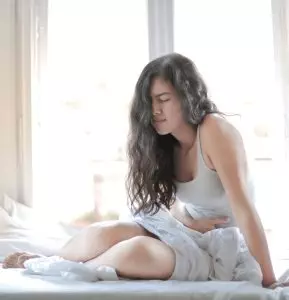
Chronic diarrhea, explosive diarrhea, diarrhea after eating? Diarrhea may be related to IBS (irritable bowel syndrome), or an IBD (inflammatory bowel disease), or a reaction to a food allergy, parasites, or stress. Acupuncture and TCM offer an alternative diarrhea treatment, so you can get relief from stomach pain and diarrhea.
Why Do I Have Diarrhea?
There can be many different causes of diarrhea, also known as loose stool. Acute diarrhea, which only lasts one or two days, will usually go away on its own.
Watery diarrhea that lasts a few days is usually due to food poisoning. Eating something that was rotten, or not cooked properly to destroy bacteria, can cause vomiting and diarrhea. Watery diarrhea can also happen when you have some type of viral infection, such as the “stomach flu.”
Chronic diarrhea, or persistent diarrhea, which lasts for weeks, or bouts of diarrhea that come and go frequently, may be related to IBS symptoms, IBD symptoms, Celiac disease, SIBO, or some other problem.
More than 6% of adults in the U.S. report having chronic diarrhea. Chronic diarrhea in children is also a serious health concern worldwide.
Top 10 Causes of Diarrhea
Diarrhea is a common condition that everyone experiences sometimes. Usually it is temporary, but it can become persistent and serious enough to require diarrhea treatment. The most common reasons a person experiences loose bowel movements include:
- Bacterial infection, traveler’s diarrhea, food poisoning, unsafe drinking water
- Viral infection, such as rotavirus, viral gastroenteritis, stomach flu
- Parasite infection, such as giardiasis
- Food allergy, food intolerance, food sensitivity, Celiac disease
- Reaction to medications like antibiotics, antidepressants, or Metformin
- Reaction to radiation therapy, cancer treatment
- IBS – diarrhea, constipation, and stomach cramps are common IBS symptoms
- IBD – colitis or Crohn’s disease, inflammatory autoimmune disorders that affect the gut
- Malabsorption of food, poor absorption of nutrients
- Menstrual cycle or Perimenopause – changes in hormones/estrogen can cause diarrhea
Certain foods can cause diarrhea, including: too much coffee, artificial sweeteners like mannitol and sorbitol, and red food coloring. Magnesium supplements can also cause loose stools.
If diarrhea lasts more than a few days, it is important to seek healthcare advice. Chronic diarrhea can lead to dehydration and fatigue, and may be happening because of some more serious condition that needs to be addressed.
What Causes Chronic Diarrhea?
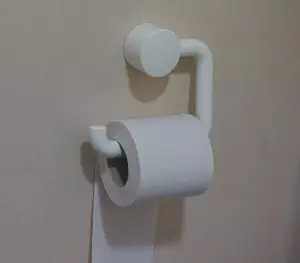
Bouts of diarrhea that keep recurring can be a symptom of disorders such as:
- IBD (inflammatory bowel disease) – the most common IBDs are ulcerative colitis and Crohn’s disease. IBD symptoms usually include bloody diarrhea and abdominal pain. IBDs can cause chronic or recurring diarrhea, which can lead to dehydration, fatigue, and weight loss. IBDs can be mild, or so serious that they cause long-lasting damage to the gastrointestinal tract.
- Ulcerative colitis – an autoimmune disorder that causes inflammation and ulcers, or open sores, in the lower gastrointestinal system, including the colon and rectum.
- Crohn’s disease – an autoimmune disorder that causes inflammation mainly in the small intestine, but can affect any part of the GI tract.
- IBS – Irritable bowel syndrome can seem similar to IBDs, also causing recurring bouts of diarrhea and stomach pain. However, IBS is considered a functional gastrointestinal disorder. It is quite common. People with IBS symptoms may have alternating bouts of diarrhea and constipation. People who tend to have more diarrhea-dominant IBS have “IBS-D.”
- Celiac disease – an autoimmune disorder in which a reaction to eating wheat gluten causes serious inflammation of the GI system, leading to abdominal pain, bloated stomach, diarrhea, malnutrition, fatigue, and skin rashes.
With these conditions, diarrhea is brought on periodically—sometimes alternating with constipation, as in some cases of IBS—by factors having to do with the diet or stress, or with autoimmune processes.
Some surgeries that affect the gastrointestinal organs—like gastric bypass, gastric sleeve, or gallbladder removal—can cause chronic diarrhea.
Chronic diarrhea can be caused by an inability of the intestinal walls to absorb nutrients, and/or of the walls of the colon to absorb liquid. It may also be due to excessive action of the intestine in terms of peristalsis, the squeezing of the intestine to move matter through.
Diarrhea Treatment
Acute diarrhea usually goes away on its own in a day or two. Often, people will use OTC remedies for diarrhea and stomach pain, such as Immodium or Pepto-Bismol.
If you have been experiencing persistent diarrhea and seek medical advice, a doctor will perform tests to figure out what is causing the diarrhea, and will offer electrolyte fluids to help with dehydration. Blood tests or a stool test will show if the diarrhea is due to a bacterial infection or parasitic infection.
If chronic diarrhea is determined to be related to a medication you are already taking, then that may need to be adjusted.
Discovery of IBS or an IBD usually involves more diagnostic testing, including a colonoscopy and/or endoscopy, to see if there is inflammation or blockage in the GI tract.
Medical treatment for IBS may involve being offered antispasmodic medications that relax the intestinal walls and slow down the movement of the bowels and can help relieve stomach cramps and abdominal cramping. Dietary changes and behavioral therapy may be recommended.
Pharmacological treatment for IBDs like colitis and Crohn’s usually involves taking a combination of anti-inflammatories and immunosuppressants, to reduce inflammation in the gut and to block the inappropriate autoimmune responses that are triggering the inflammation. Unfortunately, steroids and medications like Xeljanz can cause other side effects and health problems.
Medical treatment for chronic diarrhea may help relieve symptoms and reduce the frequency of bouts of diarrhea, but it does not necessarily address the underlying causes of diarrhea.
Acupuncture and TCM offer an effective alternative treatment for diarrhea that is more suited to each patient’s individual situation.
Can Acupuncture Help Diarrhea?
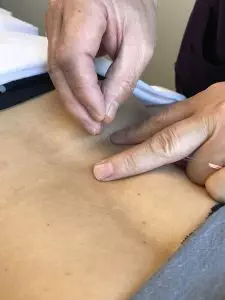
Chronic diarrhea, according to TCM theory, is usually considered to be related to the health of the spleen. In TCM, the organ systems all interact harmoniously, unless there is imbalance. The imbalance of one organ system may throw off other systems, leading to various symptoms.
In TCM, the spleen is responsible for breaking down the nutrients from food and converting them into energy. If the spleen is not functioning properly, watery stool is often the result. Diarrhea, stomach pain, and other symptoms may differ from person to person, depending on how the spleen is interacting with the liver, stomach, or kidneys.
Common Chinese Medicine diagnosis patterns for chronic diarrhea include:
- Spleen Deficiency with Liver Qi stagnation: mucus in the stool, abdominal pain, cramping, gassiness, bloated stomach, irritability, and feelings of depression
- Spleen Deficiency with Stomach deficiency: watery stools, poor appetite, feeling full quickly, stomach distended after eating, pallor, and fatigue
- Spleen Deficiency with Kidney Deficiency: diarrhea in the morning, partially digested food in the stool, abdominal pain, lower back pain, knee pain, feeling cold
Acupuncture treatment for diarrhea, which may include moxibustion and herbs, aims to support the health of the spleen and other organs. Acupuncture has been shown to help relieve diarrhea and constipation related to IBS. Acupuncture treatment can also help with reducing stress and anxiety, which are common triggers for IBS symptoms.
Acupuncture can also help with diarrhea due to IBDs like ulcerative colitis and Crohn’s disease by reducing inflammation and helping to balance immune responses. TCM treatment for Crohn’s disease or colitis, incorporating nutrition and herbal supplements, can help improve the gut biome and strengthen the lining of the intestinal walls.
Acupuncture for Diarrhea Near Me, Los Angeles, West L.A., and Santa Monica
TCM treatment with an experienced acupuncturist near me can be very beneficial for anyone dealing with ongoing gastrointestinal distress. Both adults and children can find relief from diarrhea, constipation, stomach cramps, bloating, and abdominal pain related to conditions like IBS, IBDs, or celiac disease through acupuncture and herbs. At Art of Wellness, we have over 30 years of experience helping people with gastric disorders of all kinds.
*This article is for education from the perspective of Traditional Chinese Medicine only. The education provided by this article is not approved by FDA to diagnose, prevent, treat and cure human diseases. It should not stop you from consulting with your physician for your medical conditions. Traditional Chinese Medicine is based on Qi, which is an invisible force that usually cannot be observed by modern science. Because science focuses on testing ideas about the natural world with evidence obtained through observation, these aspects of acupuncture can’t be studied by science. Therefore acupuncture and Chinese herbs are often not supported by double-blind, randomized trials, and they are considered alternative medicine therapies in the United States.
How to Treat Dermatitis With Acupuncture and TCM
By Xiaomei Cai, L.Ac., Ph.D. & Qineng Tan, L.Ac., Ph.D.
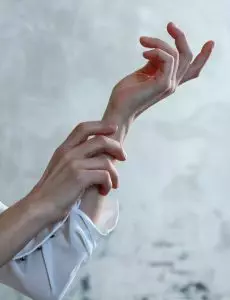
Itchy skin, dry skin irritation, or skin rash? Dermatitis is a broad term that covers many skin problems, including eczema, heat rash, diaper rash, and other kinds of skin allergy. Acupuncture and TCM offer a way to treat dermatitis, eczema, and itchy skin conditions.
The medical term “dermatitis” can refer to many types of skin irritation that involve inflammation. Inflamed skin can cause itching, redness, dryness, and rashes. A dermatitis itchy skin rash is caused by an inflammatory response related to the immune system.
Eczema, also known as atopic dermatitis, is a common inflammatory skin condition; over 30 million people in the U.S. have some type of eczema. Eczema can show up as early as a few weeks after birth in some babies, or during childhood, or during adulthood.
While what exactly causes atopic dermatitis to occur in some people is not completely understood, it is generally accepted that it is a combination of genetic, immunological, and environmental factors.
Dermatitis is not contagious; it is not passed from person to person. However, you are more likely to be susceptible to dermatitis or eczema if other people in your family have it, or if there is a family history of allergies and asthma.
Eczema and other forms of dermatitis tend to “flare up” when a person is exposed to some sort of trigger and has an allergic reaction. This could be due to something in the environment, or some product or plant that touched the person’s skin. It can also be due to internal causes, like an autoimmune problem, excess heat in the body, or emotional stress.
Signs of Dermatitis:
- Itchy dry skin rash skin irritations (pruritus)
- Red rash, red bumps on skin
- Rash like a burn
- Blisters
- Thick skin, hard skin, swelling
- Scaly skin, creasing skin
- Crusty sores, painful skin sores
- Bleeding rash, oozing skin rash
- Flaking skin (dandruff)
Symptoms of dermatitis can come and go. Scratching at itchy patches or blisters associated with dermatitis can cause a skin infection, so it is important to manage and control this condition.
Acupuncture and TCM herbs can help relieve itchy skin and inflammation, while also helping to balance the immune system to prevent further eczema flare ups.
Top 10 Types of Dermatitis
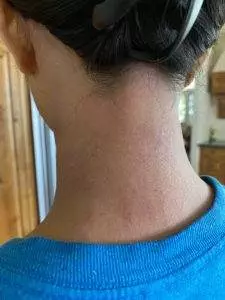
Many different conditions can cause dermatitis—meaning, inflammation of the skin. Different kinds of dermatitis include:
- Atopic dermatitis – also known as eczema, marked by dry, itchy, red patches of skin.
- Contact dermatitis – this is when a skin rash breaks out due to exposure to some kind of external irritant, such as a cosmetic product, piece of jewelry, or plant like poison ivy.
- Seborrheic dermatitis – flaking skin, also known as dandruff, occurs mostly on oily areas of the skin.
- Dyshidrotic dermatitis – (also called dyshidrotic eczema or pompholyx) small, itchy, fluid-filled blisters that appear on the soles of the feet or palms of the hands, or the tips of the fingers or toes. The blisters may break out due to exposure to an allergen or when hands and feet are often wet or sweaty.
- Diaper rash – a red rash that forms on a baby’s bottom or perineal area due to contact with the diaper and frequent wetness.
- Neurodermatitis – (also called lichen simplex chronicus) is a type of eczema marked by one or two very itchy, scaly patches that can become thickened and leathery – most often affects an area on the neck, ankle, arm, or groin. Neurodermatitis can itch so intensely that it affects a person’s sleep, and can be triggered by stressful events.
- Nummular dermatitis – (also known as discoid eczema) is marked by round, coin-shaped lesions that appear on the limbs or torso. These lesions can become infected with scratching, and may be related to poor circulation.
- Perioral dermatitis or Periorificial dermatitis – pink scaly patches or pustules that form around the mouth. This occurs more commonly in young women. Some doctors believe it may be related to candida, and/or influenced by hormones.
- Stasis dermatitis – (also called venous stasis dermatitis) itchy, scaly, discolored skin around the lower legs and ankles, due to poor circulation and blood pooling in the lower extremities.
- Dermatitis herpetiformis – a bumpy, blistered skin rash (looks similar to a herpes outbreak, but is not actually related to herpes simplex) that is related to celiac disease, triggered by ingesting gluten or wheat.
Psoriasis can look similar to eczema, but it is a separate condition that can coexist with various types of dermatitis. Rosacea redness can also look similar to dermatitis, but is a distinctly different condition that can occur at the same time as dermatitis.
What Causes Dermatitis?
A combination of the immune system reacting to irritants in the environment, and genetic predisposition.
Common environmental factors that can contribute to dermatitis include:
- Chemicals
- Air pollutants
- Fluoride in water or toothpaste
- Fragrances, perfumes, air freshener
- Fragrances in skin products, cosmetics, lotions, soaps
- Tobacco smoke
Other conditions that may occur simultaneously with dermatitis include: depression, anxiety, insomnia, allergies, and asthma.
Eczema Treatment
There are many different types of medical treatment for dermatitis. Some are topical—meaning, applied to the skin. Others are taken in an oral pill form, or injected into the skin.
Topical corticosteroid creams, which can help reduce skin inflammation, are the most common treatment for eczema and dermatitis. These can help reduce itching and swelling. However, prolonged use of topical steroids can cause side effects like thin skin, spider veins, and acne. Steroids can affect growth in children, and can cause eye problems like glaucoma or cataracts in older people.
Steroids that are taken orally, like Prednisone, can help control systemic inflammation for a time, while patches of scaly skin heal. However, there are many serious side effects associated with taking steroids for a long time, and it is also possible to experience a “rebound effect.” This means that the dermatitis symptoms come back even stronger when a person stops taking the steroid medications.
Calineuron inhibitors and JAK inhibitors are designed to stop certain chemical processes in the body related to immune responses. They can help block immune system reactions to calm the dermatitis skin problems.
There are many new types of treatment for eczema being developed. Phototherapy, or light therapy, using ultraviolet (UV) light, may be tried when topical treatments are not working for eczema that is widespread over the whole body. However, this kind of therapy can cause prematurely aging skin, changing skin pigmentation, and potentially increase the risk of skin cancer.
Acupuncture and TCM herbal supplements offer a way to treat eczema without any damaging side effects.
Can Acupuncture Help Dermatitis and Eczema?
One of the core concepts of TCM is the 5 Elements Theory, according to which organs of the body correspond with seasons and weather conditions. According to this theory, eczema and other kinds of dermatitis arise due to imbalances within the internal organ systems affected by external conditions, such as Wind and Heat.
The lungs, especially, are connected to the skin in the TCM system. The lungs can be affected by excess heat or stagnation in the liver. Thus, an itchy red rash on the skin is actually an expression of a deeper, more complex internal condition. Therefore, it is necessary to treat dermatitis and eczema not only with topical creams, but to use acupuncture and herbs to balance all of the organ systems.
The acupuncturist gets clues about which internal organs are out of harmony by observing the eczema symptoms: the type of rash or scaly skin, the color and temperature. Each individual case of dermatitis is unique, triggered by different irritants, and arising from a person’s overall state of health.
One study showed that acupuncture treatment worked better than antihistamines for helping to reduce the itchiness of atopic dermatitis pruritus. Acupuncture also helps to reduce inflammation and overall stress.
Studies done in China to determine the efficacy of an herbal formulation developed for eczema showed that it worked well to reduce itching and recurrence of rash.
As systematic review of over 350 studies on acupuncture for eczema showed the patients who were given acupuncture treatment instead of conventional treatment experienced better overall symptom reduction and quality of life.
Top 5 Tips to Prevent Dermatitis Itchy Skin

There are things you can do to help prevent eczema flare-ups from occurring and avoid recurrent rashes.
- Do not bathe in very hot water.
- Keep showers short and warm, and use gentle cleansers, without strong chemical perfumes.
- Do not scrub your skin during or after the shower, while drying. Pat gently.
- Use moisturizer frequently to maintain a protective layer on your skin.
- Wear long pants and sleeves when hiking and adventuring. Wear gloves when gardening.
Acupuncture Near Me for Dermatitis in Los Angeles and Santa Monica
Acupuncture can help relieve itching, aid in the healing of lesions, help stimulate healthier immune responses, and reduce stress. TCM treatment can also be sought as a safe treatment for children with eczema, or during pregnancy, as it is free of negative side effects.
TCM can also help patients with other skin conditions, including signs of aging, acne, hives (urticaria), rosacea, vitiligo, and psoriasis.
*This article is for education from the perspective of Traditional Chinese Medicine only. The education provided by this article is not approved by FDA to diagnose, prevent, treat and cure human diseases. It should not stop you from consulting with your physician for your medical conditions. Traditional Chinese Medicine is based on Qi, which is an invisible force that usually cannot be observed by modern science. Because science focuses on testing ideas about the natural world with evidence obtained through observation, these aspects of acupuncture can’t be studied by science. Therefore acupuncture and Chinese herbs are often not supported by double-blind, randomized trials, and they are considered alternative medicine therapies in the United States.
How to Treat Colitis With Acupuncture and TCM
By Xiaomei Cai, L.Ac., Ph.D. & Qineng Tan, L.Ac., Ph.D.
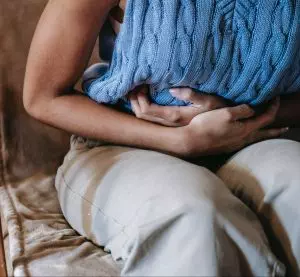
Diarrhea, bloody stool, fatigue, fever? These could be colitis symptoms. Ulcerative colitis is an inflammatory bowel disease (IBD) that causes swelling in the large intestine, abdominal pain, bloating and bloody diarrhea. Acupuncture and TCM can offer an alternative colitis treatment to help relieve ulcerative colitis symptoms.
Colitis is a gastrointestinal disease in which the colon—also known as the bowel, or the large intestine—becomes inflamed and can develop open sores, or ulcers.
Ulcerative colitis is the term for colitis that is caused by an autoimmune disorder. The immune system launches an attack on the tissues of the intestinal lining, causing inflammation and sores. It is similar to Crohn’s disease: an autoimmune disease that can affect any part of the digestive tract.
What causes colitis? There are several problems that can lead to abdominal pain and diarrhea, and sometimes it can be difficult to discover what is causing a person to have colitis symptoms.
Parasites, bacterial infections, or food poisoning can cause pain, inflammation in the colon, and diarrhea. For example, e coli bacteria, sometimes found in improperly cooked beef, can cause colitis symptoms. This is known as e colitis, or hemorrhagic colitis.
IBS (irritable bowel syndrome) symptoms can seem similar to those of colitis. People who suffer from IBS can have abdominal pain and diarrhea, urgency and mucus in their stool. However, IBS is considered a functional gastrointestinal disorder, not a disease. IBS does not cause permanent damage to the intestinal lining, while colitis can.
Ischemic colitis is a specific type of colitis caused by a blockage of blood flow to the intestine. This is more common in older adults, and can be the result of a blood clot in an artery, or low blood pressure due to heart failure or recovery from some major surgery. Some conditions, like lupus or sickle cell anemia, can restrict blood flow to the gastrointestinal tract. It could also happen due to a bowel obstruction caused by a tumor or hernia. Some medications can also restrict blood flow to the intestine.
TCM and acupuncture treatment, whether alone or as an adjunct to conventional treatment, can help relieve the symptoms of colitis by reducing inflammation in the intestine, helping to stop bleeding and helping to restore normal bowel movements.
Colitis Symptoms
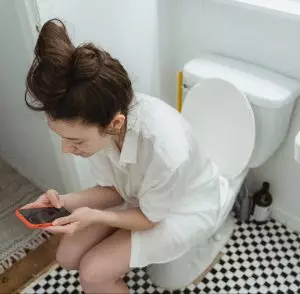
Ulcerative colitis symptoms can be mild at first and become more persistent and/or severe over time. Some common symptoms of colitis, or IBD symptoms, include:
- Loose stool, loose bowel movements, diarrhea
- Urgency to go to the bathroom, feeling like you have to poop all the time
- Feeling like you have to poop, but not being able to
- Bloody stool, bloody poop
- Mucus in stool
- Abdominal pain
- Abdominal cramps, cramping
- Rectal pain
- Fatigue, feeling tired all the time, no energy
- Fever
- Weight loss
Symptoms of ulcerative colitis can come and go, or “flare up” at times. When symptoms abate, this is called “remission.”
Children can have colitis, which may cause them to not grow properly.
Colitis Treatment
Testing for IBDs might start with some basic blood tests and a stool sample test to see if there are any bacterial or parasitic causes of diarrhea. If inflammation needs to be looked at more closely to discover its location and cause, a colonoscopy or sigmoidoscopy may be done. Imaging—X-ray, ultrasound, or MRI—may be used to show if there is some kind of obstruction of the intestine.
If testing and treatment have ruled out IBD and other potential causes, a tissue biopsy may be used to diagnose ulcerative colitis, the autoimmune form of colitis.
Generally, once colitis or inflammatory bowel disease has been diagnosed, the main goal is to reduce inflammation in the colon. Anti-inflammatory drugs will usually be prescribed. Anti-diarrheal medications and pain relievers provide some symptomatic relief.
Ulcerative colitis is usually treated with a combination of anti-inflammatories and immunosuppressants. Unfortunately, these types of medications can have significant side effects. Long term use of corticosteroids can cause bone loss and swelling, while immunosuppressants can stress the liver and pancreas.
Newer pharmacological treatments include “small molecules,” like Xeljanz, which act as anti-inflammatories and immunosuppressants. However, these drugs have been flagged for potentially causing heart problems, and maybe even cancer.
When medications and dietary changes don’t help enough, surgery to remove part of the large intestine may be sought.
Acupuncture and TCM offer an alternative treatment for colitis, which may help relieve symptoms without side effects.
Can Acupuncture Help Colitis?
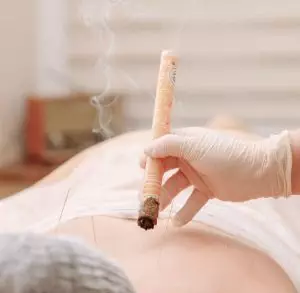
TCM herbs and acupuncture treatment are excellent modalities for helping to reduce inflammation. In the case of colitis and ulcerative colitis, the central problem is that the body is producing an inflammatory response in the large intestine that leads to pain and dysfunction. According to TCM theory, imbalances in the internal organs can cause heat, dampness, or blood stasis. In different people, the ways that colitis shows up may vary, depending on the pathogenic forces at work.
Acupuncture points to help relieve diarrhea, bloating, and bleeding in the colon will be combined with beneficial herbs to help clear heat and dampness. One study done in China showed that patients with ulcerative colitis who received acupuncture and herbal supplements in addition to conventional pharmaceutical treatments healed more quickly than those who did not receive TCM. They also reported feeling less anxiety and depression.
A systematic review of studies done regarding TCM for colitis concluded that acupuncture and herbs were effective compared to medical treatments.
Studies have shown that acupuncture can help balance the gut biome and help strengthen the intestinal walls.
Acupuncture has been shown to help people whose colitis is in remission to maintain better function.
TCM herbs, used in combination with conventional treatment, may help improve the healing of the mucosal lining of the intestine. One study showed that herbs helped stop bleeding from the colon in patients with ulcerative colitis.
Moxibustion has also been shown to help as a treatment for IBD, helping to relieve diarrhea, nausea, and abdominal cramping.
Acupuncture is believed, in part, to help regulate inflammatory bowel diseases by providing positive stimulation of the vagus nerve, which plays an important role in inflammatory responses.
Acupuncture Near Me for Ulcerative Colitis in Los Angeles and Santa Monica
Acupuncture can be an excellent adjunct to standard treatment for gastrointestinal disorders of all kinds, including: IBS, Crohn’s disease, Celiac disease, and Candida. At Art of Wellness, we have over 30 years of experience helping people with IBD and colitis to improve their quality of life.
*This article is for education from the perspective of Traditional Chinese Medicine only. The education provided by this article is not approved by FDA to diagnose, prevent, treat and cure human diseases. It should not stop you from consulting with your physician for your medical conditions. Traditional Chinese Medicine is based on Qi, which is an invisible force that usually cannot be observed by modern science. Because science focuses on testing ideas about the natural world with evidence obtained through observation, these aspects of acupuncture can’t be studied by science. Therefore acupuncture and Chinese herbs are often not supported by double-blind, randomized trials, and they are considered alternative medicine therapies in the United States.
How to Treat Bronchitis With Acupuncture and TCM
By Xiaomei Cai, L.Ac., Ph.D. & Qineng Tan, L.Ac., Ph.D.

Chest cold with a productive cough, shortness of breath, coughing up mucus? These could be acute bronchitis symptoms. Acupuncture and TCM herbs can provide an alternative bronchitis treatment to help relieve chest congestion and a chronic cough.
Bronchitis is a respiratory infection in which the bronchial tubes, or airways, become inflamed. It typically causes chest congestion, a wet cough, coughing up phlegm, and difficulty breathing. Acute bronchitis usually develops due to the same kinds of viral infections that cause the common cold or pneumonia.
Chronic bronchitis refers to long-term inflammation of the lungs and bronchial tubes that is not related to an infection. If a person has a cough with mucus that lasts for months, or happens year after year, it is considered chronic bronchitis. This can happen as a result of smoking, and/or exposure to air pollution.
Like emphysema, chronic bronchitis is considered a chronic obstructive pulmonary disease (COPD). There are other lung conditions that can cause symptoms similar to those of bronchitis, including: asthma, sinusitis, whooping cough (pertussis) and tuberculosis.
Acute bronchitis usually clears up within a few weeks, but the persistent cough may linger. Antibiotics do not help treat viral infections, so the treatment for bronchitis is usually just to help suppress the cough and reduce aches and pains.
TCM treatment with acupuncture and herbs can help relieve bronchitis symptoms without side effects. It can also help remove pathogens and blockages affecting the lungs, so that bronchitis doesn’t turn into a chronic, recurrent condition.
Bronchitis Symptoms
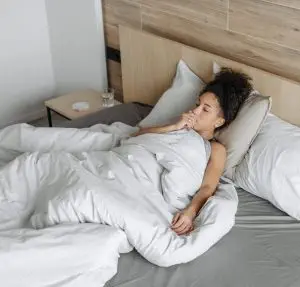
Acute bronchitis causes the airways of the lungs—the bronchial tubes—to swell, and the lungs to produce extra mucus. Coughing, with clear or yellowish phlegm, is the primary symptom of bronchitis.
The most commons symptoms of bronchitis include:
- Cough, phlegmy cough, cough with mucus, productive cough, persistent cough
- Chest soreness, tightness in chest, chest pain
- Fatigue, feeling tired
- Shortness of breath, trouble breathing, wheezing
- Sore throat
- Stuffy nose, runny nose
- Body ache, headache, back pain, muscle pain
- Low grade fever
Is bronchitis contagious? It is not so much bronchitis as a condition—that is, inflammation and congestion in the lungs—is contagious, as the virus or bacterial infection that caused bronchitis to develop is contagious for a period of time. The coughing may last for a while beyond the infectious period. Sleeping can be difficult, because the cough tends to worsen when a person lies down.
Bronchitis Treatment
When you seek treatment for acute bronchitis from a physician, it is generally treated in the same way as the common cold. Recommendations will include:
- Rest
- Increase fluid intake, drink more water
- Take OTC pain relievers
- Take expectorants or cough suppressants to manage coughing
- Use a humidifier or sit in a steamy shower room to help relieve congestion
These remedies may help to temporarily relieve symptoms while a person gets over the infection. However, some of these medications can cause side effects, and they do not do much to help prevent bronchitis from coming back the next time a virus is going around.
Chronic bronchitis, as a COPD, is considered a chronic illness that must be managed, so as to slow its progression. Quitting smoking is the first recommendation. Then, bronchodilators, steroids, and/or antibiotics may be prescribed to help open the airways, reduce inflammation, and prevent recurrent infections.
These medical interventions, too, can come with significant side effects. Corticosteroids, in particular, if taken over a long period of time, can cause liver damage.
Making a major lifestyle change, like getting rid of a nicotine addiction, is easier said than done.
Fortunately, acupuncture and TCM herbs offer a complementary medicine to help relieve bronchitis symptoms, treat the deeper root causes, and also help with quitting smoking, if necessary.
Can Acupuncture Help Bronchitis?

According to TCM theory, bronchitis is the result of pathogenic forces like Wind and Dampness affecting the lungs and other organs systems that are interrelated. An acupuncturist looks for the particular patterns of symptoms in each individual, and tailors acupuncture treatment and herbal supplements, according to which organ system patterns are involved. These may include:
- Lung dampness
- Lung deficiency
- Lung dryness
- Phlegm-heat obstructing lung
- Wind invasion
- Spleen Qi deficiency
- Spleen/Kidney Yang deficiency
- Qi and/or Yin deficiency
Multiple studies have shown that acupuncture treatment and herbal cough preparations can be even more effective than conventional medicines when helping to relieve post-infectious chronic coughing.
Studies have shown that acupuncture can help reduce bronchial inflammation and damage, relieve coughing and reduce phlegm production. It can also help boost immune function.
One study detailed how patients with chronic bronchitis, who had been taking steroids for years, were able to reduce or entirely stop their use of steroids after receiving acupuncture treatments for a few months.
Chinese herbs, used in combination, can help relieve bronchitis symptoms and work on other levels, too. They can help clear toxins from the tissues and promote regeneration of new, healthy tissue, and improve immunity, so that the next time a virus is going around, the body is better equipped to fight it off quickly.
Top 5 Tips for Getting Rid of Bronchitis Naturally
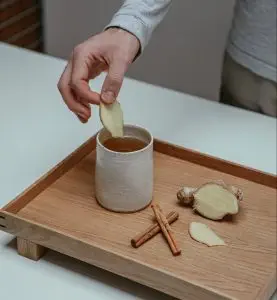
Getting acupuncture treatment and specific herbs for your condition will be helpful. In addition, you can help strengthen your lung health by practicing these habits:
- Avoid dairy products, which increase mucus production
- Drink warm herbal teas, fresh ginger tea, and lemon water to help stay hydrated and thin phlegm. Avoid caffeine and alcohol, which dehydrate you. Ginger helps reduce inflammation.
- Steam an asian pear until very soft, and eat like applesauce. This helps clear mucus.
- Breathing exercises can be helpful; ask your acupuncture practitioner to show you some good breathing techniques.
- Take Yin Qiao pills at the very first sign of a cough or sore throat. This is a traditional Chinese formulation that helps ward off colds and coughs if taken early.
Acupuncture Near Me for Bronchitis in West Los Angeles
When a respiratory infection turns into a nagging cough, or worse, into chronic bronchitis that keeps coming back, year after year, it is important to seek treatment. With acupuncture and TCM herbs, it is possible to recover from a bronchial infection more quickly and comfortably. With regular acupuncture “tune-ups,” you can end the cycle of a chronic cough.
*This article is for education from the perspective of Traditional Chinese Medicine only. The education provided by this article is not approved by FDA to diagnose, prevent, treat and cure human diseases. It should not stop you from consulting with your physician for your medical conditions. Traditional Chinese Medicine is based on Qi, which is an invisible force that usually cannot be observed by modern science. Because science focuses on testing ideas about the natural world with evidence obtained through observation, these aspects of acupuncture can’t be studied by science. Therefore acupuncture and Chinese herbs are often not supported by double-blind, randomized trials, and they are considered alternative medicine therapies in the United States.